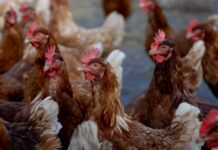MADISON, Wis. – Recent outbreaks of avian influenza add to the list of reasons why it’s best not to buy live Easter bunnies, chicks and ducklings for children.
That’s the word from Wisconsin’s state veterinarian, Robert Ehlenfeldt, and state humane officer, Yvonne Bellay.
“Baby chicks, ducklings and rabbits are not toys. They’re fragile living things that take knowledge, money and time to care for,” Bellay said.
“And they may carry diseases that can pass to humans, or that threaten the state’s poultry industry,” Ehlenfeldt added.
The Wisconsin Department of Agriculture, Trade and Consumer Protection has long recommended that people stick to the stuffed versions of Easter bunnies, chicks, and ducklings, for health, humane, and economic reasons.
Human health. Chicks and ducklings can harbor salmonella bacteria without showing symptoms themselves.
“Salmonella passes easily to humans handling the birds. Adults may suffer few or no symptoms, but salmonella infection can be life-threatening for small children,” Bellay said.
“Children want to kiss and cuddle these cute little animals, and that’s the riskiest thing you can do.”
While it’s far less likely to occur than salmonella, rabbits may also carry tularemia, a bacterial infection similar to plague.
Poultry kept outdoors may be especially susceptible to avian influenza, which occurs naturally in the wild population.
Humane treatment. Baby animals are very fragile.
“Their bones are small, and birds’ bones are hollow. They snap easily,” Bellay said.
“Chicks and ducklings need to be kept under a warming light for the first few weeks. All three species need commercial feeds to be sure they get the proper nutrition. They’re susceptible to infections.
“This is pretty intensive animal husbandry. It takes some knowledge, it’s time-consuming and it costs money.”
Keep as a pet? Rabbits need socialization if they’re going to make good pets, and demand as much attention as a dog or cat.
“Rabbits chew on wood in your home, they need to be litter-trained, and they need to be spayed or neutered, or they may develop behavior problems,” Bellay said.
“This is the point when they show up at animal shelters.”
Adult chickens and ducks, too, can become difficult to keep as pets as they mature.
“Some people may keep hens in their backyards if local ordinances permit it, but a rooster crowing is going to be unwelcome in most neighborhoods,” Bellay said.
Keeping either rabbits or poultry outdoors presents another set of problems, she added.
They need shelter from the elements, and from predators that may be able to attack even through a cage.
Economic threats. “There are many strains of influenza, mostly harmless to both birds and people,” Ehlenfeldt said.
“But the virus can mutate and evolve into forms that infect humans, or are more deadly to poultry.
“So even when we find a mild strain, we take strong measures.”
While humans don’t become sick from most influenza strains, they can pick up the virus when they handle infected birds and carry it on their hands, shoes and clothing.
The virus is always present in wild birds, so it is possible for domestic animals or people to pick it up without knowing it, Ehlenfeldt said.
“You or your pet won’t get sick, but you could potentially pass that virus on to find its way eventually to a commercial poultry operation with a lot to lose.”
Responsibility. “Teaching children how to handle animals is important, and keeping pets is a good way to help kids learn responsibility,” Bellay said.
“But too many of these holiday purchases are impulse buys, without enough thought to the animals’ needs and the future.
“When you add in the disease risk, those few weeks of fun can turn into a nightmare for you, your children, and the animals.”
Get 4 Weeks of Farm and Dairy Home Delivered









